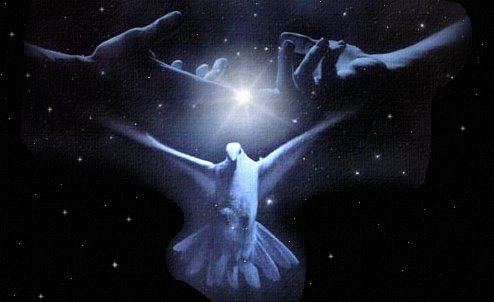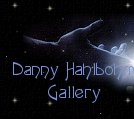|

Spirit in Action

By the Rev. Lee Woofenden
Bridgewater,
Massachusetts, April 13, 1997
Readings:
Psalm 143 "Let
your good spirit lead me on a level path"
Matthew 12:15-28 "I will put my spirit upon him"
Apocalypse Revealed #875 The mind acts through the body
Teach
me to do your will, for you are my God. Let your good spirit lead me on
a level path. (Psalm 143:10)
In the
classic 1966 science fiction film Fantastic Voyage, a three
person medical team is miniaturized, along with a submarine and two
other crew members, and sent inside the body of a famous scientist to
remove a blood clot from his brain using a precision laser gun. The
movie has its share of suspense and adventure--and the obligatory
beautiful young woman brought along to be endangered and rescued. The
drama unfolds against a backdrop of scenes from the inside of the human
body writ large. Amid all the excitement, there are a few calm moments
in which the characters can express their wonder at the amazing
processes of the human body . . . and philosophize on the
human condition.
During
one of these calm moments, as the submarine makes its way through a
capillary in the lungs, the crew is spellbound by the sight of carbon
dioxide and oxygen being exchanged between the blood in the capillary
and the air in the alveoli (tiny air sacs) of the lungs. Dr. Duval
(Arthur Kennedy), one of the two medical doctors on board, explains how
the exchange takes place. His explanation ends in an expression of awe
and wonder: ". . . but to actually see one of the
miracles of the universe: the engineering of the cycle of the
breath!"
Dr.
Michaels (Donald Pleasence) replies, "Oh, I wouldn't call it a
miracle. Just an interchange of gases. The end product of five hundred
million years of evolution."
Dr. Duval
can't believe his ears. Tearing his eyes away from the wonders outside
the submarine's big front windows, he turns to Dr. Michaels. "You
can't believe that all this is accidental--that there isn't a . . .
creative intelligence at work. . . ." Dr. Michaels
attempts to reply, but he is cut off by yet another emergency warning
alarm, and the movie goes on.
The
science in Fantastic Voyage may have been warped a bit to fit the
requirements of a 1960s movie plot, but this little vignette reflects an
issue that runs through our culture today just as much as it did thirty
years ago. The movie's setting--within the human body--serves to focus
the issue where it properly belongs: in the human realm. For we humans
are the only beings on this earth who think about whether or not there
is a creative intelligence at work behind both the vast workings of the
universe and the microscopic workings within our own bodies.
The two
doctors represent two different world views. Dr. Duval sees creative
intelligence--what we would call God or spirit--behind the wonders of
the physical universe. Dr. Michaels sees only physical processes:
chemistry and evolution. In the course of the movie, we find out that
Dr. Duval, who was initially suspected of being a bad guy, is actually a
good guy who saves the famous scientist, while Dr. Michaels, who was
considered so trustworthy that he was given command of the mission, was
actually a bad guy bent on sabotaging the operation. Swedenborg himself
could not have plotted it better!
These
days we are usually a little more subtle about who the good guys and the
bad guys are, and how that relates to their particular spiritual
beliefs. Some "good guys" have gotten a bad taste in their
mouth about religion, and have good hearts despite a lack of belief in
God and spirit. Some "bad guys" do profess a belief in God and
spirit--and we can't always tell whether that belief is strongly held or
merely used as a tool to accomplish their own ends. Only in the
spiritual world, where our outward words and actions come to exactly
match our inner beliefs and motives, can we make a simple correlation
between people's stated beliefs and their inner character. Here on
earth, where everyone is a mixture, the picture is much more
complicated.
However,
if we broaden our consideration from individual personalities to
universal principles, the different attitudes of the two doctors provide
us with food for thought as we "digest" this universe of ours
and decide what attitudes and beliefs about it we will make a part of
our own minds and lives. Do we think that this physical universe is all
there is? If so, how does that affect the way we live? Do we think that
there is a world of spirit and a divine being above and beyond this
physical world? If so, how does that affect the way we live?
The
answer to the first set of questions (whether there is only matter, or
whether there is also God and spirit) is a personal one that we must
each arrive at for ourselves. There is no way it can be demonstrated one
way or another--and I am certainly not going to attempt to demonstrate
in this sermon that God and spirit exist. Presumably the presence of
each of you in church this morning indicates that you are at least
leaning toward the idea that God and spirit do, indeed, exist.
The
answers to the second set of questions (how each belief affects the way
we live) are also personal for each one of us. But we can take a more
general look at these questions, and perhaps gain something helpful to
us in the here-and-now. After all, if the question of belief in God and
spirit versus belief in materialism has no practical effect on our
lives, why would we ask it at all, besides mere curiosity?
God and
spirit are not simply a matter of curiosity. They are forces . . .
no, beings that affect every instant in our experience of life.
No one can make the decision for us to believe in God and spirit. But
once we make the decision--even while we are making the
decision--we can begin to understand and feel the effects of the
presence of God in our lives. If our minds are closed to spirit, we will
not feel spirit. That is why it is impossible to get across to a
confirmed materialist what it is like to experience the spiritual level
of existence. But when we open our minds to spirit, then we can know and
feel the tremendous difference it makes. Then we know that it is
actually the spirit within our bodies that moves us to do everything
that we do.
Psalm 143
illustrates the way our body and actions depend on spirit and God
within. It begins with a cry to God to answer our prayers, and then
continues:
For the enemy has pursued
me,
crushing my life to the ground,
making me sit in darkness like those long dead.
Therefore my spirit faints within me;
my heart within me is appalled.
"My
spirit faints within me; my heart within me is appalled." These are
not medical conditions. The "heart" mentioned here is not made
of muscle; it is made of love. Yet we know that when our spirit faints
and our heart is appalled, it has a profound effect on our body. Even
when we are in perfect health, if our spirit is fainting, our body is
listless and ineffective. Our muscles may be in fine tone; our central
nervous system may be firing perfectly. But when our heart and
spirit--our love and motivation--are down, we accomplish nothing. To
turn around the old saying, "Where there's no will, there's no
way!"
When
David wrote this Psalm, he may well have been thinking of literal
enemies that sought his physical life. Fortunately, most of us here
today do not have to face this sort of enemy. But we do face enemies
within. They are the enemies that cause our spirit to faint, bringing
about inner exhaustion. They are the enemies that cause our hearts to be
appalled, giving us heartaches that hurt more profoundly than any
physical illness. They are the enemies of hopelessness and despair, and
of our own inner resistance to spiritual change and growth. One of those
enemies is the very idea that there is no spirit and there is no
God--that there is no deeper meaning to life. Yet our Psalm does not
leave us without hope. It continues:
I remember the days of
old,
I think about all your deeds,
I meditate on the works of your hands.
I stretch out my hands to you;
my soul thirsts for you like a parched land.
Yes,
there is hope. There is the hope of new spirit and new life from God.
There is the hope of new insight into our spiritual and emotional
predicament. The hope for new love to fill our empty heart. Stars and
planets, even earth with its plants and animals, cannot by themselves
quench this kind of inner thirst. No, it is the spirit that is behind
both the earth and our own selves that we must reach toward. Ultimately,
we must reach toward the Lord for the living water that satisfies our
spiritual thirst. That thirst can be satisfied when we pray from our
heart the prayer of David from Psalm 143:
Let me hear of your
steadfast love in the morning,
for in you I put my trust.
Teach me the way I should go,
for to you I lift up my soul.
Save me, O Lord, from my enemies;
I have fled to you for refuge.
Teach me to do your will, for you are my God.
Let your good spirit lead me on a level path.
It is not
hard to see that everything we think and do comes from something in our
mind and heart--from something we think and feel. We can say, with
Swedenborg, that all human action is our mind acting. Or to use
another phrase, everything we say and do is spirit in action. Simply
having this perspective helps to weaken the hold on us of many of the
physical forces and urges that we often think of as being so strong. If
we know that it is our minds and hearts, not our bodies, that drive our
lives, then we can consider and make decisions about just what we
want to be in the driver's seat of our inner self.
If you
can forgive the pun, this is what Jesus was "driving at" in
our reading from Matthew. The spirit of God was in Jesus more directly
than it is in any of us. Yet the Pharisees attributed his healings to
the ruler of demons instead of to God. They questioned the motivating
factor in Jesus' work. Was it from God, or from evil?
Once we
have recognized that it is really our minds and spirits that drive our
lives, this becomes the question for us as well. There are powerful
forces at work in our spirits, pulling us in opposite directions. God is
powerful for good on one side, and we feel hell as powerful for evil on
the other. Through our decisions and our actions, we decide during the
course of our lives which of these will rule in us and motivate our
lives. And so we come full circle to the prayer with which we started:
Teach me to do your will,
for you are my God.
Let your good spirit lead me on a level path.
 

 

ęDanny Hahlbohm, used with permission
Painting entitled Trinity
Music:
Prism: Color of Love
ęBruce DeBoer and used with permission

|